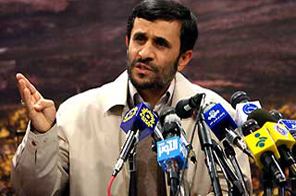Western powers challenge Iran over 'bloody repression'
GENEVA: Western powers accused Tehran of waging "bloody repression" since elections last year as they challenged Iran to open up to international scrutiny during a UN human rights meeting on Monday.
In a public review of Iran's record at the UN Human Rights Council, Britain, France, the United States and other Western nations expressed deep concern about reports of killings, arrests and torture in a clampdown on dissent.
"The authorities are waging bloody repression against their own people who are peacefully claiming their rights," French ambassador Jean Baptiste Mattei said.
"France recommends that Iran accept the creation of a credible and independent international inquiry mechanism to shed light on these violations," he told the Council.
Senior Iranian official Mohammad Javad Larijani rejected a "barrage of accusations" and accused some Western nations of "double standards" following their support for repression under the Shah of Iran.
"Definitely there is problem of credibility," said Larijani, secretary general of Iran's High Council for Human Rights.
The United States and Britain called on Iran to open up to visits by the United Nations investigator on torture as well as other human rights experts.
The UN's independent rapporteurs say they have been unable to gain access to the country for five years despite an open invitation the previous Iranian president, reformist Mohammad Khatami, made in 2003.
UN human rights chief Navi Pillay also asked Tehran to allow experts from her office in before she is able to take up a new but tentative Iranian invitation to visit next year, her spokesman said on Monday.
British ambassador Peter Gooderham said that despite Iran's stated commitments to uphold fundamental freedoms, "grave human rights violations continue to be committed."
Western countries also urged a halt to executions of child offenders, "disproportionate use" of the death penalty against political opponents, violence against women, discrimination and a clampdown on free speech.
President Mahmoud Ahmadinejad's disputed re-election last June plunged the Islamic republic into one of its worst ever political crises, with the opposition refusing to abandon the streets despite often deadly crackdowns on protests.
Backed by Cuba, Syria and Venezuela, Larijani defended Tehran's legal safeguards and accused foreign nations of supporting "terrorist" groups on its borders.
"The situation of human rights has consistently been used as a political tool to apply pressure against us and to advance certain ulterior political motives by some specific Western countries," Larijani told the UN Council.
Iranian officials also highlighted steps to improve women's access to education, health and social status, and to protect children as well as the representation of religious minorities, and bolster courts.
"The Iranian society is a successful model of brotherly and amicable coexistence," Larijani noted, claiming cultural or religious differences with some Western values.
"We're not claiming that there's no wrongdoing in Iran," he added.
US Assistant Secretary for Democracy and Human Rights Michael Posner said afterwards that Washington would keep up the pressure.
"It is not a question of cultural differences that people are being tortured ... or shot in the streets," Posner told journalists.
"The challenge is that the presentation flies in the face of what is happening on the ground," he added.
All UN member states must submit to a four-yearly review by the 47 countries in the Human Rights Council, which can only compile recommendations.
US Secretary of State Hillary Clinton said on Monday that she feared Iran was moving towards a military dictatorship.






